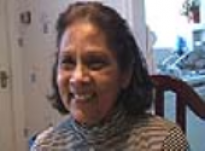Sandra - Interview 07

More about me...
Sandra always attended for cervical screening. After she’d had her menopause, she went for a routine cervical screening test but found that she was bleeding afterwards for over a week. She went to see her GP, who referred her to hospital.
After tests, Sandra was diagnosed with stage 1 cervical cancer and told that she would need a hysterectomy. A few days after surgery, however, there were complications and Sandra needed to have bowel surgery as well. She felt extremely weak afterwards and said the hysterectomy ‘was nothing’ compared to the bowel surgery. At home, because she lived alone, she needed support from family and friends. However, it was a very difficult time because her family had to travel from overseas to care for her.
It took Sandra a couple of years to regain her strength and she is now on a specific diet. Sandra said that she had a back street abortion at a younger age and felt that this, as well as having fibroids, had caused her cervical cancer. She was happy with the information and care she received from her doctor, and advised women to attend for cervical screening.
Sandra felt a slight twinge when she had a biopsy but it was a very quick procedure and the doctor was good.
Sandra felt a slight twinge when she had a biopsy but it was a very quick procedure and the doctor was good.
A biopsy is quite simple. It’s just like having a smear, where they went into the same way, but, when doing so, if I can remember, all I remember is little… like an extra minute or two maybe because she’s an expert, she did it brilliant. And you felt like a twinge, a sharp pain like a twinge, maybe that’s when they snipe off a piece of the flesh or whatever they have to take.
And she knows what she was doing, but she was good at it. She didn’t take long. It was just like a smear, it’s not difficult, very easy. She did it very quick, so it’s like a smear, went in there, snipe, that’s all, you know. You don’t even feel a snipe. You put to yourself that it’s going to be a snipe.
It felt twinge, like a pain and that was it. That was the pain about. Because that was the pain I felt and she gave me painkillers. And I asked her, because I said, “And if I had one done, is this normal?” And she said, “Yes, it’s normal for you to have some pain.” And she gave me two painkillers with some water.
It can be difficult for people living alone. Sandra's family lived abroad but took it in turns to come and look after her.
It can be difficult for people living alone. Sandra's family lived abroad but took it in turns to come and look after her.
You need a little help because I live on my own; I have no one here except friends. All my family are abroad. And I could’ve coped a little better, and have a little assurance in my mind if I have somebody here.
It doesn’t have to be a long day like, only things that you need them to do, maybe to bring a little shopping. Or to give me something to eat, or help me from the bed or so, assist me to go to the toilet or to run my bath, or to help me up the step, to walk me up. To get me to do my bath, and bring me down. Just my changing clothes, someone to wash my clothes, in the machine right here. But when you’re so ill you can’t even think of these things. You can’t think of the outside world at all. And I was deprived of that.
...My family had to come all the way from abroad, one lot from Florida, one lot from Canada, New York, Trinidad. And they took it in turns to help me. So if I didn’t have family, I don’t know what I would have done.

